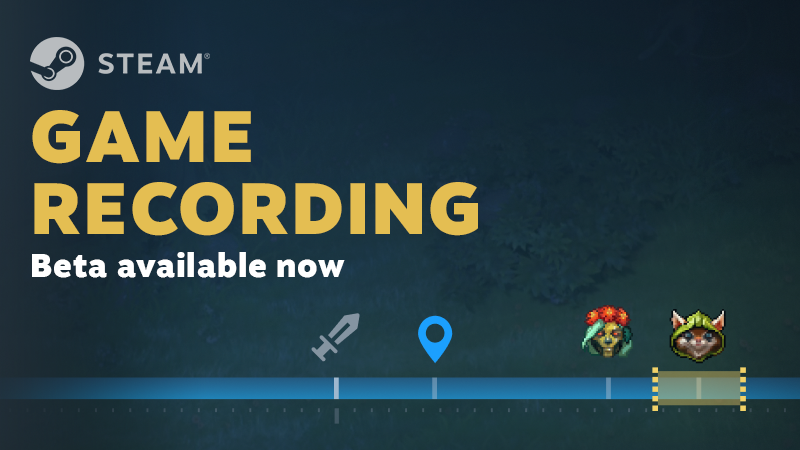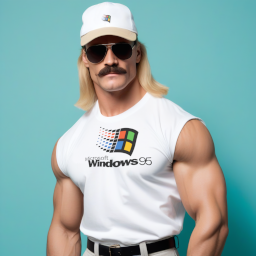@mr_MADAFAKA Oooooh, nice! Nvidia Highlights or whatever it was called without requiring special hardware, and for every game? I like!
From FAQ:
“Game Recording works for any game that supports the Steam Overlay - it may not work for some older games. Games may choose to support event markers on the Steam Timeline. As we start the beta, the following games have implemented timeline markers: Dota 2 and Counter-Strike 2.”
@mr_MADAFAKA Close enough, I’ll take it! I don’t think I’ve personally seen a game where Overlay would have broken anything.
Definitely happens in some older games or games with weird implementations / ports
There is also an open-source alternative to this: https://github.com/matanui159/ReplaySorcery
Although it seems to be no longer actively maintained.
I prefer Gpu Screen Recorder as open source alternative
if you don’t mind setting up a bit, OBS actually also have a replay buffer feature to do that. It’s a good software to have even if you are not streaming because of the virtual camera feature that let you share screen with very deep customization too.
And thus we have come full circle back to the XFire experience after so many years 😂
Wow I haven’t thought about xfire in a long time
The idea of replaying recent gameplay to see what happened is great.
I wish you could record Mic audio with it.
I can see this being pretty clever. Valve will be able to interpret a bunch of game event data for smart capture.
I hope a bunch pf games add support for it
There is a developer facing video on how to enable and enrich timeline events: https://www.youtube.com/watch?v=YwBD0E4-EsI
Though I’m not sure yet in whether timeline events are automatically created from existing game aachievement scenarios etc.
Lol, how?
If they aren’t hooked into the game engine, they are simply recording video, not metadata produced by the game engine.
I’d presume through the same mechanism leveraged for achievements:
Timeline and Event Markers
The Steam Timeline appears whenever you’re actively recording. Timeline-enhanced games generate event markers as relevant game events happen. Steam achievements and screenshots automatically create markers as well.
ISVs can enhance this as desired:
In addition to being able to record any game you’re playing, timeline-enhanced games are games that can proactively notify Steam when relevant events happen. These events are represented along the timeline with details specified by developers.
I’d think this could have broader reach than nvidia highlights depending on how easy it is to work with.
Yes, both those would require a Steam integration with metadata about events. But you’re suggesting they’re harvesting data somehow?
Where did I say they were harvesting data?
Hah. So if you turn the background recording on it keeps a browsable timeline with metadata about which modes you were playing, presumably based on your rich presence data?
How freaked out do you think everyone at Valve was this past month watching Microsoft’s Recall feature get ripped to shreds?
All joking aside, I do not trust background recording on PC. I’ve seen how easy it is to bypass Steam Link’s restritions on streaming your desktop, I guarantee that some of these clips would end up with something I don’t want in them. I do think metadata annotation on long manual recordings is potentially interesting, but it IS creepy.
Shadowplay already did that like a decade ago, it’s not a new concept. Since it only detect and record when you run your game, i don’t see why people will freaked out by that.
Well, it’s two different things, one is the background record, which is less “freaking out” and more “not for me on PC”.
The other is blending the background recording with metadata on a timeline, which starts getting Recall-y in terms of logging a video recording of what you were doing where there is also a data record of what you were doing. I do think that part starts stepping over to kinda creepy.
It’s more useful here than as a OS feature, though, because yeah, I can see it saving one the trouble of recording different matches separately or having to scrub back and forth to find certain things.
If you’re talking about Game-Added Marker, that’s only applicable if the game have that feature implemented in. Otherwise, i seriously not sure why someone will freaked out by this, they can just, idk, turn it off like normal people. It’s not like an invasive OS feature that even if turned off, the feeling of it still watching you are there. Whether this feature from Steam will send metadata back to Valve still remain to be seen, as people will take a dig on the network side of this after release, but so far it doesn’t indicate it will.
Besides, Nvidia Experience also have the exact feature implemented, it’s called Nvidia Highlight, where dev can set when and where Nvidia should take a clip of your game. No out is being freaked.
It’s not just the games that support it, it will also tag other metadata it knows automatically on all games, like achievement unlocks. And you can manually add tags, too. It’s all telemetry that Valve and the devs are already extracting from you, of course, plus whatever you volunteer in manual markers, but it’s still a bit creepy to see it laid out on a timeline like that.
All joking aside, I do not trust background recording on PC. I’ve seen how easy it is to bypass Steam Link’s restritions on streaming your desktop, I guarantee that some of these clips would end up with something I don’t want in them. I do think metadata annotation on long manual recordings is potentially interesting, but it IS creepy.
I don’t really see the issue with this as long as the videos are processed locally and only uploaded if the user chooses to.
Well, that was MS’s argument and I don’t think it flies there either.
On a console it’s fine, it’s only ever gonna catch a game. On the Steam Deck as well, same deal.
For a desktop PC that you also use for work and media and other stuff… yeah, I want to be extra sure that if I alt-tab from a game to quickly answer some work email that’s not going to accidentally be recorded anywhere, even locally. Like Recall, I can see people who would not mind that as long as the data stays in their computer, I myself like knowing that I don’t accidentally leave exposed files with potentially sensitive information laying around without my knowledge.
I mean, it’s fine, it just means turning the feature off. I don’t use the equivalent feature from Nvidia for the same reasons. I still think it’s funny that MS got (rightfully) put on blast for basically doing this and then Apple and Valve both announced similar features immediately afterwards. It’s made for some awkward mental gymnastics on the Internet recently.
The feature only records the game btw, i get your concerns but it does not record other windows
Yeah, I get that, but that’s also true of Steam Link and Steam’s general streaming solution (which I presume is what this is using) and it’s trivial to get a different window to show up or even to get to the desktop from the in-game streaming, particularly if you have a non-Steam app in your library.
So yeah, it’s gonna be on demand recordings from me… assuming the quality holds up (Nvidia’s kinda sucks). Otherwise that’s what OBS is for.
This won’t be possible with Wayland. It’ll be possible on Xorg desktops but Wayland has explicit separation of permissions per-window and must be granted as such by the user (or on steam’s gamemode, probably automatically will target the game window’s surface/gamescope instance)
I think it’s fine because the recording is not saved unless you explicitly tell it to save. If it’s anything like Nvidia’s shadow play, you set an amount of time, say 5 minutes that it keeps in memory, and when you save the clip, it simply saves that file containing the last 5 minutes.
I don’t think that’s true of either. They’re not saving all this video in RAM. Steam’s system even asks you during setup to choose a temp folder for the video to sit in until you choose to save it as a clip. I don’t know when it flushes that cache, but I’m assuming it doesn’t and simply overwrites it when it runs out of the allocated space to allow you to go back and save something after you close a game.













